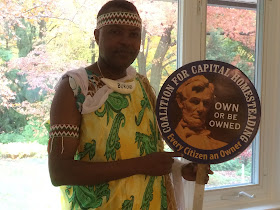A number of events have happened
this week that both highlight the need for something like “Justice University”
and — at the same time — make it more likely that the idea can be brought to
fruition. As you will see, this is
mostly due to the positive reaction we’ve received from interacting with the
Hubert Humphrey Fellowship program:
 |
| Norman G. Kurland |
• Dr. Norman Kurland’s keynote address at the Mid-Atlantic
ESOP Association Conference went very well.
Norm, president of the all-volunteer, interfaith Center for Economic and
Social Justice (CESJ) in Arlington, Virginia, spoke on the history of the ESOP
and how the concept could be extended to every child, woman, and man, not
restricted to those who happen to work for a corporation, through the
implementation of a Capital Homesteading program.
• On Monday evening Norman Kurland and Jean-Marie Bukuru
attended the Humphrey Fellowship State Department gathering that included 167
of the current Fellows, ambassadors, and people from the United States
Department of State. A number of
important people attended, with whom the CESJ team was able to converse in
French and in English. Norm reported
that the people were very friendly and seemed very open to the Just Third
Way. Even the economists were interested
in something besides the tried-and-failed Keynesianism that has brought the
global economy to the brink of disaster.
An important contact was made with Ann Howard, the niece of Hubert
Humphrey, who interacts at the highest levels.
 |
| Max Weisman's comment |
• Max Weismann, co-founder with Mortimer Adler of the Center
for the Study of the Great Ideas in Chicago and currently on the faculty of Justice University (accepting an appointment during the visit to Chicago a few years back), had a very positive comment on
Tuesday’s blog posting, “In Defense of Common Sense.” Of course, a photo of Adler was given a
certain prominence. . . . Other postings
in that particular series have garnered their share of praise, e.g., “WOW. . . thank you!!” (“The
Paradox of Il Poverello”), and “[B]etter than most history books out
there.” (“The American
Regression”). If we can find the funding
or a sponsor, it might be possible to turn the series into a “CESJ Paradigm
Paper,” or even a series for CESJ’s proposed “Justice Classrooms” for Justice University.
 |
| Humphrey Fellows from many countries. |
• On Tuesday, members of the CESJ core group attended a
“networking reception” for the Humphrey Fellowship program. A large number of the current Fellows were
able to attend, some of them coming from sponsoring institutions as far away as
California, and Fellows coming from every continent except Antarctica. Again, a great deal of interest was expressed
in the Just Third Way, especially the monetary, tax, and legal reforms that
would enable a country to finance economic development without relying on
foreign investment or a wealthy domestic elite.
• We received a request for help in answering some questions
in economics from a local college student.
Fortunately, although the questions from the professor were somewhat
poorly phrased (particularly from a Just Third Way perspective), the student
was able to summarize coherently, and we provided her with enough of a
framework and sufficient cites and references for her to compose a paper that we
think could satisfy both justice and an instructor who seems to phrase things
somewhat obscurely.
 |
| Pope Pius XI |
• Astrid U., our CESJ Fellow currently pursuing her Masters
degree in labor economics at the University of Louwen (Louvain) in Belgium, is
preparing to begin her thesis. We were
able to provide her, too, with a number of possible sources, especially on how
to resolve the “economic dilemma” inherent in relying on past savings to
finance ownership of capital by wage workers who cannot afford to reduce
consumption in order to accumulate sufficient savings to purchase capital. The answer, of course, is to shift financing
of new capital to future savings, and let the new capital pay for itself out of
future increases in production instead of past decreases in consumption. Some of the important sources for Astrid’s
work (from the Just Third Way perspective, of course) would be William Cobbett,
Charles Morrison, William Thomas Thornton, Pope Leo XIII, Heinrich Pesch, G.K.
Chesterton and Hilaire Belloc, Pope Pius XI, Fulton Sheen, Goetz Briefs, and
(of course) Louis Kelso and Mortimer Adler for why “labor” must own capital,
and John Law (with reservations), Adam Smith, Henry Thornton, James Gilbart,
John Fullarton, Thomas Tooke, Harold Moulton, and (of course) Louis Kelso and
Mortimer Adler for how “labor” (and everyone else) can own capital.
• As of this morning, we have had
visitors from 53 different countries and 51 states and provinces in the United
States and Canada to this blog over the past two months. Most visitors are from
the United States, Canada, the United Kingdom, the Philippines, and India. The
most popular postings this past week were “Thomas Hobbes on Private Property,” “Halloween
Horror Special XIII: Mean Green Mother from Outer Space,” “Aristotle on Private
Property,” “Three Key Books on Common Sense, IV: Chesterton Versus the Slavery
of Past Savings,” and “Three Key Books on Common Sense, VII: The American
Regression”/“Three Key Books on Common Sense, XI: The Awful Apparition of
Aristotle” (tie).
Those are the happenings for this week, at least those that
we know about. If you have an
accomplishment that you think should be listed, send us a note about it at
mgreaney [at] cesj [dot] org, and we’ll see that it gets into the next
“issue.” If you have a short (250-400
word) comment on a specific posting, please enter your comments in the blog —
do not send them to us to post for you.
All comments are moderated, so we’ll see it before it goes up.
#30#